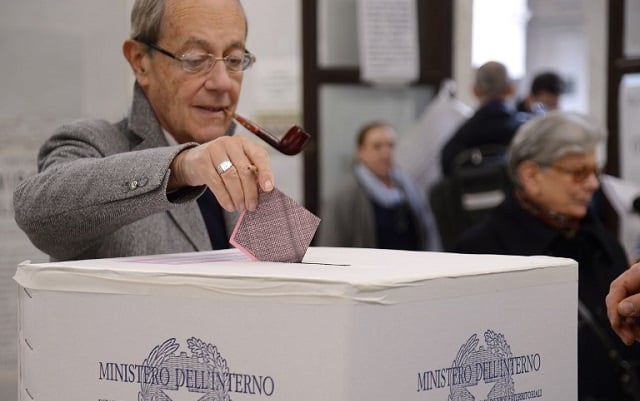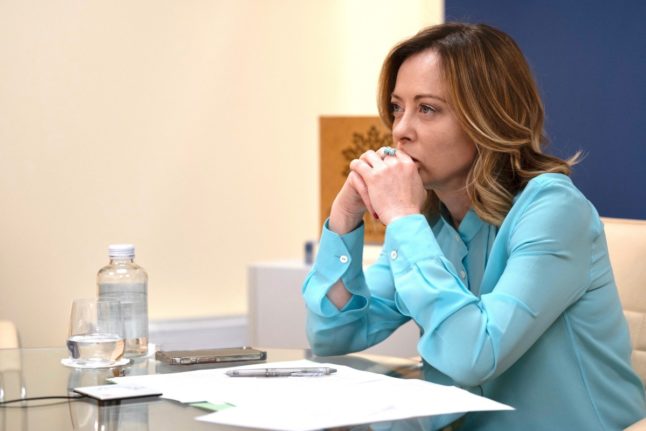1) The Five Star Movement may be a victim of its own success
The key takeaway from the votes was that the anti-establishment Five Star Movement failed to break through.
After scooping more than a quarter of votes in the 2013 general election and taking control of Rome and Turin in last year's mayoral elections, it seemed the Movement's star was indeed rising. But in the weekend's votes, the party's candidates failed to make the second round of voting in any regional capitals or larger cities.
That included hotly-watched contests in Genoa, home of the Movement's leader Beppe Grillo, and in Parma, where an ex-Five Star mayor will go head-to-head with the centre-left candidate in the second round, while the Movement's candidate received just over three percent of the vote.
One reason for the setback might be disillusionment with the Five Star mayors currently in power, and particularly Virginia Raggi's Rome administration, which has been accused of failing to tackle the capital's rubbish crisis and has been linked to corruption scandals.
Professor James Newell, who teaches Italian politics at the UK's University of Salford, told The Local: “The difficulties of Virginia Raggi in Rome and the high media profile events there may have had something to do with it, with consequent perceptions that the M5S may not be terribly different from other parties after all.”
He added that local elections are traditionally viewed as “referenda on the performance of parties at a national level”, making votes for minor or extreme parties more likely. Many were expecting the Movement to do well, and their failure to break through is likely to be causing concern among the party.
READ MORE: What is the Five Star Movement?
Rome mayor Virginia Raggi. Photo: AFP
2) A new logic of protest voting
Low turnout might show that the Five Star Movement failed to gain protest votes, with discontented voters instead staying at home.
The Five Stars have positioned themselves as 'anti-establishment' and neither left- nor right-wing. This is one of the reasons they have done well in previous local elections; voters may be more likely to cast a 'protest vote' to show dissatisfaction with the major parties than they would in a general election.
Turnout was down to just over 60 percent, from more than 66 percent in the last equivalent elections held in 2012. This is a surprise because Italians are generally highly politically engaged: although voting hasn't been compulsory since 1992, voter turnout at general elections has only dipped below 80 percent once since then, in 2013.
The figure on Sunday was particularly low in Genoa, not even reaching 50 percent, followed by Como and Lucca.
“It may be that those who would otherwise have protested against mainstream politics by voting for the M5S, have this time protested by staying at home,” explained Professor Newell.
He added that voters may have been put off by a perception that “support for the Movement equals ungovernability”, particularly after a recent deal between the four major parties on a new electoral law fell through, making them unwilling to put a cross next to the names of its candidates.

Five Star Movement leader Beppe Grillo. Photo: AFP
3) … But we shouldn't rule out the Five Stars just yet
Italy's media were quick to label the results a “Five Star flop” on Monday, something Grillo was quick to hit back at – and he could well be right.
Grillo warned his critics: “Delude yourselves so you can sleep more soundly; we continue to move forward on our path,” and said the results in fact showed the “slow but inexorable growth” of the party.
Democratic Party leader Renzi also said Grillo should not be “given up for dead”, though he added it was “clear” that the anti-establishment party had lost. “They're in difficulty, but they're a rival at the next election,” said Renzi, possibly keen to deter any would-be protest voters.
National polls have been showing the Five Stars neck-and-neck with the Democratic Party.

Grillo's blog post was quick to point out the party's growth compared to the 2012 elections, and while this may appear to be an effort to save face, it does show the public aren't tired of them yet. There are also logistical reasons why the party may perform less well at a local level than nationally.
“The party lacks robust organizational networks in the localities (it is in many respects a ‘virtual party’) and it may yet be able to pick up, in a national contest, the votes of significant proportions of those who abstained on Sunday,” said Newell.
A large number of the votes will go through to a second round, with few candidates obtaining over 40 percent of the vote – showing that, far from a return to the traditional dichotomy many newspapers were quick to hail, Italian politics remains fragmented.
4) The centre-right were the biggest winners
While Grillo and Renzi both claimed a victory in the votes, it was the centre-right which performed best.
Its candidates received the most votes in Genoa – a longtime left-wing stronghold – as well as in the Calabrian capital Catanzaro, Taranto, Padua, and Verona. The Northern League's leader, Matteo Salvini, said that Renzi was the “only one defeated” and pointed to the Genoa result, where the centre-right candidate was five points ahead of the centre-left's.
In Palermo, the centre-left candidate won outright thanks to a lower majority threshold in Sicily, and the centre-left was also ahead in the Abruzzo capital of L'Aquila.
Forza Italia leader Silvio Berlusconi said the results showed that the centre-right can win elections when united, and if it puts forward the right candidates – who, he said, “in most cases come from civil society and not the political profession”.
Meanwhile, Renzi said he would not rule out a coalition between the Democratic Party and Berlusconi's, suggesting he is concerned about the threat of a united right.

Silvio Berlusconi (centre) pictured with Matteo Salvini, leader of the Northern League (R) and Giorgia Meloni (L), leader of the Fratelli d'Italia, during the December referendum campaign. Photo: AFP
5) It's too soon to make big predictions
This was the last time Italians headed to the polls before the upcoming general elections, and so was seen as a key test for each of the parties and a clue as to how that vote might go. But this comes with some big caveats.
Firstly, not all Italians voted. The local elections took place in around 1,000 of the country's towns and smaller cities, with around 9.2 million of the country's 60.8 million population eligible to vote.
“Each of these elections will have been influenced by local issues, and they only involved a portion of the electorate,” said Newell. “It is difficult to sum the votes received by parties across municipalities in order to compare them, because the parties do not necessarily present candidates everywhere, under the same labels in combination with the same allies.”
What's more, in 103 of the 168 municipalities which held elections, the final result won't be known until the run-off ballot scheduled for June 25th. This could give a better idea of voting intention in the general election, and will be closely watched in Italy.



 Please whitelist us to continue reading.
Please whitelist us to continue reading.
Member comments